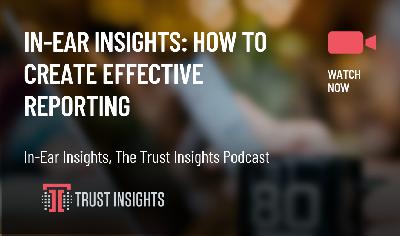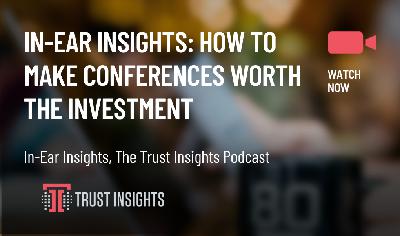In-Ear Insights: Account Management in the Age of AI
Description
In this episode of In-Ear Insights, the Trust Insights podcast, Katie and Chris discuss the essentials of excellent account management and how AI changes the game.
You will discover how to transition from simply helping clients to proactively taking tasks off their to-do list. You will learn the exact communication strategies necessary to manage expectations and ensure timely responses that build client trust. You will understand the four essential executive functions you must retain to prevent artificial intelligence from replacing your critical role. You will grasp how to perform essential quality checks on deliverables even without possessing deep technical expertise in the subject matter. Watch now to elevate your account management skills and secure your position in the future of consulting!
Watch the video here:
Can’t see anything? Watch it on YouTube here.
Listen to the audio here:
https://traffic.libsyn.com/inearinsights/tipodcast-account-management-in-age-of-ai.mp3
- Need help with your company’s data and analytics? Let us know!
- Join our free Slack group for marketers interested in analytics!
[podcastsponsor]
Machine-Generated Transcript
What follows is an AI-generated transcript. The transcript may contain errors and is not a substitute for listening to the episode.
**Christopher S. Penn – 00:00 **
In this week’s In Ear Insights, Trust Insights is a consulting firm. We obviously do consulting. We have clients, we have accounts, and therefore account management. Katie, you and I worked for a few years together at a PR firm before we started Trust Insights and managed a team of folks. I should clarify with an asterisk: you managed a team of people then to keep those accounts running, keep customers and clients happy, and try to keep team members happy. Let’s talk about what are the basics of good account management—not just for keeping clients happy, but also keeping your team happy as well, to the extent that you can, but keeping stuff on the rails.
**Katie Robbert – 00:51 **
The biggest thing from my experience, because I’ve been on both sides of it—well, I should say there are three sides of it. There’s the account manager, there’s the person who manages the account manager, and then there’s the account itself, the client. I’ve been on all three sides of it, and I currently sit on the side of managing the account manager who manages the accounts. If we talk about the account manager, that person is trying to keep things on the rails. They’re trying to keep things moving forward. Typically they are the ones who, if they choose, they can have the most power, or if they don’t, they have the least power.
**Katie Robbert – 01:38 **
By that I mean, a good account manager has their hands in everything, is listening to every conversation between the stakeholders or the principals and the client, is really ingesting the information and understanding, “Okay, this is what was asked for. This is what we’re working on. This is discussed.” Whatever it is they don’t understand, they take the initiative to find out what it means.
If you’re working on a more technical client and you’re talking about GDELT and code bases and databases and whatever, and you’re like, “I’m just here to set up meetings,” then you’re not doing yourself any sort of favors.
**Katie Robbert – 02:21 **
The expectation of the account manager is that they would say, “All right, I don’t understand everything that was discussed, but let me take the notes, do a little research, and at least get the basics of what’s happening so that I, as the person acting on behalf of the consulting agency, can then have conversations without having to loop in the principal every single time, and the principal can focus on doing the work.” The biggest success metric that I look for in an account manager is their ability to be proactive. One of the things that, as someone who manages and has managed larger teams, is someone just waiting around to be told what to do. That puts the burden back on the manager to constantly be giving you a to-do list.
**Katie Robbert – 03:13 **
At the level of a manager, an account manager, you should be able to proactively come up with your own list. Those are just some of the things off the top of my mind, off the top of my head, Chris. But you also have to be fair. You managed the team at the agency alongside with me, but you were also part of the team that was executing the work. And you rely heavily on account managers to tell you what the heck is happening. So what do you look for in account manager skills?
**Christopher S. Penn – 03:49 **
It goes back to something that our friend Mitch Joel often says, which is, “Don’t be another thing on the client’s to-do list,” because nobody wants that. Nobody wants more on their to-do list. Ideally, a good account manager is constantly fishing with the client to say, “What else can we take off your to-do list?”
**Katie Robbert – 04:09 **
Right.
**Christopher S. Penn – 04:09 **
How can we make your list shorter rather than longer? That determines—no, there’s that and one other thing, but that’s one of the key things that determines client success—is to say, “Look, here’s what we got done.” Because the more you go fishing and the more stuff that you take away from the client, the happier they are. But also, when it comes time for renewal, the more you can trot out the list and look at all the things we’re doing, look at all the things that we did—maybe that were just slightly out of scope, but within our capabilities—that we improved your life, we improved things, we got done everything we said we were going to get done.
**Christopher S. Penn – 04:47 **
And maybe we demonstrated capabilities so that when renewal time comes, you can say, “Hey, maybe we should increase the retainer because we demonstrated some proof of concept success in these other areas that we also know are really challenging.” Management consultant David Meister talks about this a lot in terms of growing retainers. He says, “I will show up at my own expense to your annual planning meeting. I will sit in the back and I will not speak until spoken to, but I am there as a resource for you to ask me questions as an expert.” And he said 10 times out of 10, he walked away with a bigger retainer just by sitting, listening to your point, knowing what’s going on with the client, and also going fishing.
**Christopher S. Penn – 05:33 **
The other thing—and this is both an account management thing and a sales thing—is, and this is something that I suck at, which is why I don’t work in account management, is very timely responses. Somebody—the client—lobs a tennis ball over the net and you immediately return. Even if you have nothing to say, you can just say, “Hey, got it. We’re here. We’re paying attention to your needs. We are responsive.” And those two things, being able to go fishing and being highly responsive, to me, are success indicators for a good account manager.
**Katie Robbert – 06:12 **
I definitely agree with the highly responsive. One of my expectations for any of the teams, whether it’s now or at the agency, was if a client sends an email, just acknowledge it. Because there is nothing worse than the anxiety of, “Do I follow up? Do I set?” We deal with that sort of on the sales side—people will ghost us all the time. That’s just part of sales. And it’s a fine line of follow-up versus stalking. We want to be proactively following up, but we also don’t want to be harassing and stalking people because that then, to your first point, goes to you being one more thing on their list to follow up with.
**Katie Robbert – 06:57 **
Let’s say a client sends over a list of questions and we don’t have time to get to it. One of the things that we used to do with the agency was, “Okay, let’s acknowledge it and then give a time frame.” We saw your email. We’ll get back to you within the next three business days just to set some kind of an expectation. Then, obviously, we would have a conversation with whoever’s responsible for doing the work first: “Is that a reasonable timeline?” But all of that was done by the account manager. All of that was coordinated by them. And that’s such an important role. One of the things that people get wrong about a role like an account manager or a project manager is that they’re just admins, and they’re really not.
**Katie Robbert – 07:41 **
They’re really the person who keeps it all together. To keep going with that example, so the client says, “I have a bunch of things.” The account manager should be the first person to see that and acknowledge it. “We got it, we will respond to you.” And then whoever is on our side responsible for answering: “Okay, Chris, we have this list of questions. You said it could be done within 3 days. Let me go ahead and proactively block time for you and make sure that you can get that done so that I can then take that information and get back to the client, hopefully before the timeline is up, so that it’s—keep them really happy.” What is it? Under promise, over deliver?
**Katie Robbert – 08:27 **
I was about to say the reverse, and that would























